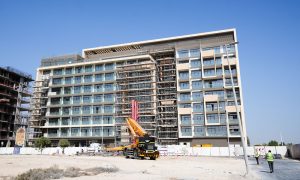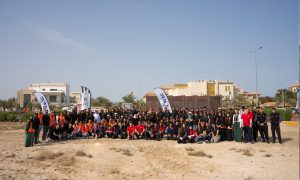Building a consensus
Though a complex and stakeholder-heavy project, the GCC Railway has made genuine progress.

Though a complex and stakeholder-heavy project, the GCC Railway has made genuine progress. There has been a lot of heartburn about the GCC Railway’s moving goalposts and its mixed progress in the member states. But arriving at a consensus for such a complex, stakeholder-heavy, intra-regional project is easier said than done.
Since 2009, when the project received the go-ahead from the Gulf Cooperation Council (GCC) Summit, only the UAE and Saudi Arabia, together accounting for over 60% of the GCC Railway network, have made progress. Yet, substantial ground has been covered in terms of putting in common standards and systems.
The GCC Railway is, perhaps, the world’s first railway network to be implemented as a regional, integrated, and interoperable railway; in this case, linking the six GCC member states and their respective national railways, catering to both freight and passenger traffic.
The $15.5bn, 2,117km long mega project will link Kuwait in the north of the Arabian Peninsula to Oman in the south, through Saudi Arabia, Bahrain, Qatar and the UAE.
Large complex projects must deal with an equally large number of high-level stakeholders. In the case of the GCC Railway, stakeholders include ministries of transport and finance of the member states, railway companies and authorities, customs, security and immigration, consultants and suppliers.
Speaking at MEED’s Arabia World Construction Summit in Dubai recently, Dr Ramiz Al Assar, World Bank Resident Adviser, Gulf Cooperation Council-Secretariat General (GCC-SG) pointed out that major decisions on the project have to pass muster with the ministerial committees (transport and finance) and the foreign affairs ministries, with key decisions going all the way up to the GCC Summit.
“This cycle usually takes up to a year but we try to expedite it as much as possible,” he said. “The most difficult thing in such projects is to achieve a consensus among the stakeholders but the GCC-SG has been fairly successful on that front.”
Achievements to date
Al Assar pointed out that common guidelines that govern Detailed Engineering Design (DED), operations, institutional and regulatory requirements are key to ensuring an integrated and interoperable railway network.
On the design front, all the member states have adopted the DED guidelines and are on track to complete the DED for their segments by the end of 2014. However, member states with smaller segments of the network have time till 2015 to complete their DEDs. Also, the guidelines for operations, institutional and regulatory requirements are in the final draft stage and will be finalised by the end of this year.
All the above guidelines will be endorsed officially by the GCC Summit to ensure that member states stick to them while developing the project.
In 2013, the member states completed and endorsed the engineering maps that monitor updated railway alignments based on actual implementation on the ground.
“The most critical issue is to monitor border-crossing areas where the alignment flows seamlessly,” explained Al Assar. “It was agreed to update the engineering maps twice a year to ensure that the railway alignment reflects the latest developments in each of the member states.”
He held up this achievement as a testament to local capacity building because the initiative was led by Etihad Rail working in tandem with the GCC-SG and the member states to make it happen. Another example on the same lines is an ongoing project, led by Qatar Railway, to create a draft master procurement schedule, which will track the implementation schedules of the member states.
“Procurement of the railway is critical to ensuring the integration of the railway,” said Al Assar. “Qatar Railway is coordinating with the member states and the GCC-SG to put the schedule together, and we expect it to be endorsed this year.
Thanks to the common guidelines, the monitoring of railway alignment and the master schedule for procurement, one can be assured that the GCC Railway, once implemented, will be really integrated.”
He noted that the most successful outcome from the common guidelines, especially on the institutional front, is the proposed GCC Railway Authority. The GCC-SG has commissioned a study on the formation of this authority, its mandate and organisational structure, and how it should work with stakeholders and existing authorities in the member states, with the primary objective of ensuring the successful implementation of an integrated and interoperable GCC Railway.
Equally important are the agreements reached, in principle, on technical interoperability, the concept of origin/destination (which could pave the way for eliminating border stations where freight have to be inspected or passengers processed for immigration), a common rule book for safety procedures and regulations, a harmonised timetable and lastly, track access charges.
In a key development, the King Fahd Causeway Authority (KFCA) and GCC-SG are undertaking a feasibility study for a new causeway, which will link Bahrain to the GCC Railway via Saudi Arabia.
“The feasibility study is expected to be completed this year,” said the GCC-SG official. “We are optimistic about securing the approval to move forward.”
The GCC-SG also carried out a feasibility study in 2010 on connecting the GCC Railway from Muscat, where it now ends to Al Mazyounah near the Yemen border. In fact, a significant part of Oman’s national railway network is based on that study’s outcome.
“We are looking at all the railway developments in the region as one network,” explained Al Assar. “The mandate from the GCC Summit was to promote a regional railway which not only links all the member states but also integrates with their existing and planned railway networks. For example, including its part of the GCC Railway, Saudi Arabia’s master plan envisages 15,000-17,000km of railways.”
Mega project challenges
Al Assar noted that developing an enabling environment for the project, in terms of delivering adequate institutional capacity, enabling policies, strategies, regulations as well as economic and safety regulations, is a tough challenge as also ensuring an active role for the private sector in investing and developing the infrastructure.
Al Assar contended that mega projects like the GCC Railway could benefit from a common procurement strategy. With a number of concurrent projects, member states end up competing for the same resources, leading to project delays, shortage of skilled personnel and material cost-overruns. The master procurement schedule for the GCC Railway, once finalised and endorsed by the end of this year, is expected to facilitate the development of a regional procurement strategy.
The GCC-SG official also recommended a balanced approach to dividing the construction packages to avoid management overlays and complexities associated with fragmented works. He cautioned against the region’s propensity to put mega projects on fast track, which he noted, leads to improper planning and sub-standard ventures resulting in significant cost overruns and delays.
While concluding his presentation, Al Assar re-iterated the importance and significance of setting up a GCC Railway Authority. He said: “With what we have achieved so far, the challenges that we will face in the future are tremendous. If we don’t set up this railway authority, we will have more difficulties in achieving our objectives.”
PROGRESS REPORT
• Saudi Arabia has commenced construction of about 200km and tendered the DED for the rest of its share (450km)
• UAE has completed the construction of 150km Ruwais–Habshan link, a part of which will link with the GCC Railway. Etihad Rail is currently evaluating bids for the construction of a 190km double track from Liwa Junction to Al Ain at the Oman border and a 137km line from Ruwais to Ghweifat on the Saudi border
• Qatar Rail has invited companies to pre-qualify for Phase 1, a 146km line from the Saudi border to Mesaieed and the new Doha Port Project on the east coast
• Oman Railway Company (ORC) is in the process of prequalifying bidders for the 170km Sohar–Al Ain segment
• Kuwait has commissioned a feasibility study on its segment of the GCC Railway
• Feasibility study underway for a new Bahrain-Saudi Arabia causeway
























